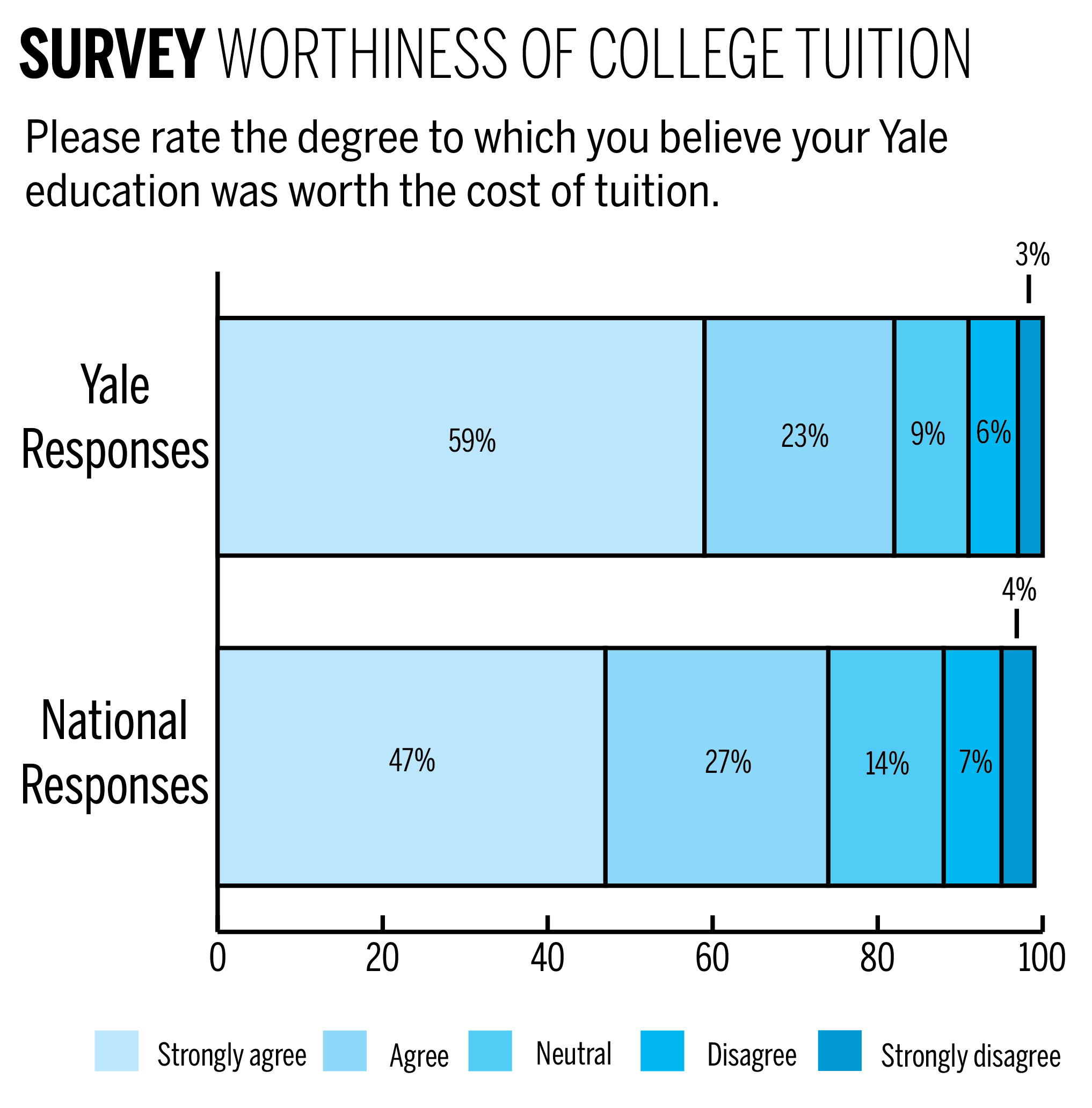
On Oct. 11, the News sent Yale College graduates in the classes of 2013 and 2014 a survey with questions about the value of a Yale degree relative to its cost. This is the first in a five-part series on the results.
Life is full of regrets, but attending Yale College is likely not one of them.
On Sept. 29, the Chronicle of Higher Education published the results of a Gallup-Purdue Index survey which found that 77 percent of 30,000 college alumni polled nationwide agreed or strongly agreed that their college degrees were worth the cost. At research universities like Yale, a slightly higher-than-average 80 percent of respondents felt the same. A significant factor governing satisfaction was whether alumni still carried student-loan debt: as the amount of debt that graduates possessed increased, so did their dissatisfaction. For recent graduates — alumni who had graduated in the last 10 years — who owed more than $50,000 in student loans, just 40 percent said the cost of their education had been worth it.
In response to the Gallup numbers, the News distributed a comprehensive survey to the classes of 2013 and 2014 asking whether they believed their education justified the cost of tuition. The responses of 344 alumni suggest that Yale, despite its prestige and resources, has a similarly satisfied pool of alumni. Still, Yale graduates who carry student loans disagreed with the otherwise positive consensus at a higher rate, in line with the Gallup results.
Eighty-two percent of Yale respondents indicated that they felt their education was worth the cost of tuition, 5 percentage points higher than the national average. The largest percentage-point differential between the national and Yale data sets stemmed from the most positive response — strongly agree — with Yale graduates choosing the option more than their national counterparts by 9 points.
Still, there were significant differences in satisfaction among various demographics within the Yale pool itself. Male graduates expressed satisfaction with their Yale degrees at a much higher rate than their female counterparts, and they also currently earn significantly higher incomes: 51 percent of male alumni are earning over $50,000 a year, compared to just 32 percent of females. Fifteen percent of men are making over $100,000 — three times more than the percentage of women. While alumni who still possessed student loans were significantly more dissatisfied with the worth of their Yale education, in line with the Gallup results, there was little variation in satisfaction by race.
Yale Vice President for Alumni Affairs and Development Joan O’Neill said the overall positive alumni responses are in line with the feedback her office receives.
“We consistently hear from alumni that they feel their Yale education was extremely valuable, that it helped them to head in the direction they are now heading in their lives — though these are young alumni — and that Yale was really meaningful in helping them become the people they are,” she said. “And it’s that gratitude we continue to see among alumni in terms of their desire to give back as volunteers and to give back financially, because they do feel their Yale education was meaningful.”
Of the 18 survey participants interviewed more extensively by the News, the vast majority said they agreed or strongly agreed that their Yale degree was worth the cost, citing benefits like on-campus opportunities and the Yale network.
Briana Rose Pigott ’13 said she considers the education she received at Yale to be invaluable, so she strongly agrees that her degree was worth the price tag. Not only did connections fostered by Yale help her find a job at a law firm for next year, but Yale also gave her the chance to learn from intellectual people with different backgrounds and opinions while on campus, she said.
“I loved Yale. It was perfect,” she said. “I wouldn’t change it or do anything differently and would do it 100 times over again.”
Still, some graduates interviewed expressed equally negative feelings.
While Hody Nemes ’13 — an environmental studies major who works at an environmental nonprofit — said although he is grateful for the education Yale provided, he ultimately would disagree that his degree was worth the cost. He said his main complaint centers on Yale professors, both in terms of the attention they paid to students and the quality of their classes.
“Professors have a lot of competing concerns, and I sometimes felt that they were not particularly interested in individual students — and to get their attention you had to really speak up and strongly seek them out,” he said. “And I felt myself sometimes wishing that Yale would do teaching workshops for professors or would require a professor … as part of their tenure track to be evaluated based on other teaching styles — to have to go through a course on how to give a good lecture, run a good seminar.”
But Aayush Upadhyay ’14 said Yale professors helped make his experience so worthwhile, leading him to strongly agree that his education merited the cost. A computer science major currently employed by Google, Upadhyay said the small size of the department enabled him to build relationships and engage in research with impressive, engaged professors.
Strongly agreeing that her Yale education justified its cost, Ellen Su ’13 said she has found her positive feelings to be the norm amongst her peers. She added that she and many of her friends were art majors, which at another school might have made it difficult to find a place of employment after college. But the intangible skills Yale fostered enabled her and her peers to do so.
“Yale gave me and my friends the skills to sell ourselves to people and learn how to present ourselves,” she said. “I’m not sure I’ve interacted with people who regret going to Yale.”
Future installments in this series will further analyze graduate satisfaction by gender, current income, Yale College major and level of financial aid.







